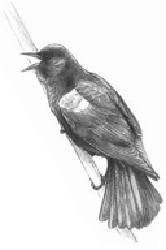Biology Reference
In-Depth Information
their nesting territories but feed peaceably, almost shoulder-to-shoulder, away from the
nesting area.
Q How many pairs of wrens can live peaceably in my backyard? Are they extremely
territorial? I'd like to put up several wren houses.
A
Wrens are
extremely
territorial. You'll get one male at most, but he may build stick
nests in each of your wren houses, and may attract more than one mate. Each female will
choose one box to nest in.
Q Do all birds defend territories?
A
No. Some birds are extremely sociable even during the nesting season. For example,
thousands of Cliff Swallows may build their gourd-shaped mud nests side by side in a
single dense colony. One reason they live in close proximity is because the specific sites
wheretheycanfindmudoftherightconsistencyandsuitablestructuresonwhichtobuild
their nests are limited. Each pair defends the area right where they're building, but once
thenestisbuilt,theydon'tseemtomindifotherswallowsperchonthenestitselfaslong
as they don't enter. After they finish building, they defend just the area immediately be-
neath their nest to prevent other birds from building a nest that might block the entrance
to their own nest.
Great Blue Herons also nest in colonies, constructing their stick nests in a stand of
dead trees. Adults may fly several miles to and from good fishing spots, and they tend to
be rather territorial around their fishing grounds, but at the nest sites they are gregarious.
Emperor Penguins don't defend territories either.They stand side byside while incub-
ating their eggs and raising their chicks. What do Cliff Swallows and Emperor Penguins
haveincommon?Theycanbothfindareaswithconcentratedfooddistantfromtheirnest-
ing site. Cliff Swallows chase after swarms of insects. Penguins leave the nesting area to
fish in the ocean. Both of these sources of food would be hard to defend.





